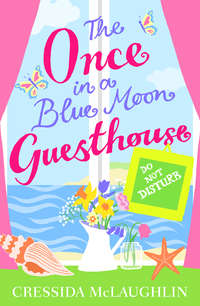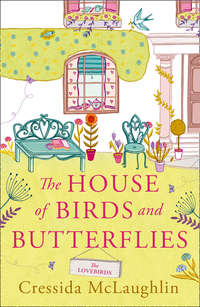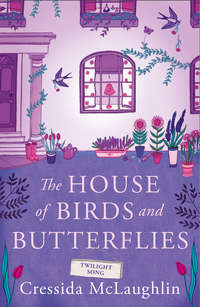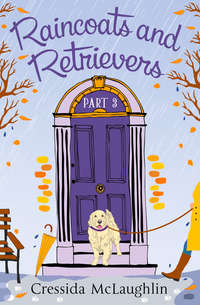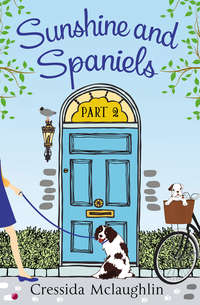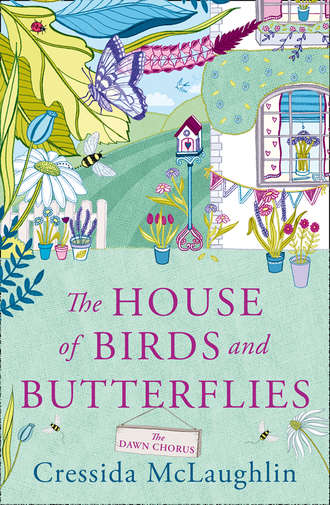
Полная версия
The Dawn Chorus

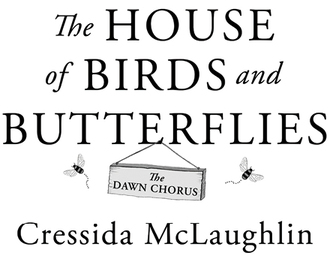

Published by HarperCollinsPublishers Ltd
The News Building
1 London Bridge Street
London SE1 9GF
www.harpercollins.co.uk
First published in Great Britain in ebook format in 2018 by HarperCollinsPublishers
Copyright © Cressida McLaughlin 2018
Cover design © HarperCollinsPublishers Ltd 2018
Cover illustration © Alice Stevenson
Cressida McLaughlin asserts the moral right to be identified as the author of this work.
A catalogue copy of this book is available from the British Library.
This novel is entirely a work of fiction. The names, characters and incidents portrayed in it are the work of the author’s imagination. Any resemblance to actual persons, living or dead, events or localities is entirely coincidental.
All rights reserved under International and Pan-American Copyright Conventions. By payment of the required fees, you have been granted the non-exclusive, non-transferable right to access and read the text of this e-book on screen. No part of this text may be reproduced, transmitted, down-loaded, decompiled, reverse engineered, or stored in or introduced into any information storage and retrieval system, in any form or by any means, whether electronic or mechanical, now known or hereinafter invented, without the express written permission of HarperCollins.
Ebook Edition © March 2018
ISBN: 9780008225803
Version 2018-02-21
Table of Contents
Cover
Title Page
Copyright
Part One: The Dawn Chorus
Prologue
Chapter One
Chapter Two
Chapter Three
Chapter Four
Chapter Five
Chapter Six
Chapter Seven
Chapter 1
Keep Reading …
About the Author
Also by Cressida McLaughlin
About the Publisher
Prologue
The autumn wind rustled through the trees, and it was as if the building was sighing. The Georgian house was still beautiful, with its yellow paintwork, white pillars either side of the double front door, a curved gravel driveway and a long-dry fountain. The September sun made the tall grass of what must have once been a manicured lawn shimmer invitingly.
But the black, wrought-iron gates were rusted closed, an ancient-looking padlock and chain adding an extra layer of security. The house had been empty for over fifteen years and, behind its elegant exterior, the cracks were expanding, the sturdy bricks and plaster giving way to trails of ivy and birds’ nests, crumbling to dust after so much neglect.
It still looked proudly over Meadowgreen, the village it had once been the beating heart of, and the Meadowsweet Nature Reserve, its decay shielded behind tall, redbrick walls. But grass, brambles and bushes thrived where there was nobody to tame them. The mansion would soon be lost to nature, only an echo of the home it had once been.
A ruby-red Range Rover drove past the walls and into the village, slowing to a near stop as if the driver were lost, before turning right into a narrow, tree-lined road. Then, towards the south corner of the house, where Meadowgreen’s main thoroughfare met a street of cosy terraces, a young woman, her dark blonde hair in a ponytail, breathed in the clean, countryside air and started walking, a handsome husky trotting alongside her.
Suddenly, the air was full of birdsong: blackbirds chorusing, the high, repetitive call of a chaffinch, the conversational tweet-chat of a flock of starlings. If anyone had been paying attention they might have noticed the flash of the afternoon sun in one of the upstairs windows, or heard the sudden rush of wind that made each blade of grass stand to attention, almost as if Swallowtail House was waking up.
Chapter One
The robin is a small, brown bird with a red breast, that you often see on Christmas cards. It’s very friendly, and likes to join in with whatever you’re doing in the garden, especially if you’re digging up its dinner. It has a beautiful, bubbly song that always stands out, much like its bright chest.
— Note from Abby’s notebook.
Abby Field was off the reserve.
She didn’t know how it had happened, but one minute she was treading the well-worn woodland trail, intent on finding the perfect spot for the ladybird sculpture, the final creature in her nature treasure hunt, and the next she had pushed her way through the branches of the fallen elder and was standing at the side gate of Swallowtail House, looking up at the impressive, empty building. As always, she strained to see inside the grand windows, which remained free of any kind of boards, as if she could discover what Penelope’s life had been like all those years ago.
She wasn’t sure why she had ended up here now, deviating from her course and slipping away from the nature reserve, but something about this beautiful, deserted building captivated her, and not just because it belonged to her boss, and had been standing empty for over fifteen years. She wondered if any furniture remained, or if the large rooms had been stripped bare of everything except cobwebs. She passed the house’s main gates on her way to and from work every day, could imagine the trail of cars that had, at one time, driven through them. But now they were kept secure, the huge padlock not to be messed with.
The house might be abandoned, but Penelope Hardinge was still intent on keeping people out.
She owned the Meadowsweet estate, the greater part of which was now the Meadowsweet Nature Reserve. Only Swallowtail House, abutting the reserve but secluded behind its red brick wall, was off limits. The stories Abby had been told by long-term residents of Meadowgreen village varied, but it seemed that Penelope and her husband Al had started the reserve soon after their marriage, that Al’s death sixteen years ago had been sudden, and that Penelope’s flight from Swallowtail House had been equally hasty.
She had left it as if it was plagued, purchasing one of the mock-Tudor houses on the Harrier estate, a five-minute drive out of the village, leaving the grand, Georgian mansion to succumb to the nature she and her late husband loved so much, although she had continued his legacy. She had been running Meadowsweet reserve with a firm grip ever since, showing no signs of slowing down even though she was now in her sixties.
For the last eighteen months, Abby had been a part of it. She had found a job that she was passionate about, and while she occasionally bore the brunt of Penelope’s dissatisfaction, and sometimes felt her confidence shrinking in the older woman’s presence, she could understand why she had to be so strict, especially now the reserve was in trouble.
Abby closed her eyes against the September sun and listened to her surroundings. The wind rippled through the woodland, the dancing leaves sounding like the rhythmic churn of waves against sand. A robin was singing its unmistakable, bubbling song, and she wondered if it was the young one who, for the last few weeks, had been landing on the windowsill next to the reserve’s reception desk, curiosity winning out over any fear of humans. He was a fluffy bird, his feathers never entirely flat, as if he hadn’t quite got the hang of preening, and she and Rosa had named him Bob. But she wasn’t sure he would stray this far out of his territory, and the reserve wasn’t short of robins delighting the visitors with their upbeat chorus.
Somewhere in the house’s overgrown grounds was the melodic trill of a warbler. It could be a blackcap or a garden warbler, their songs so similar that, even now, she found it hard to distinguish between them.
Opening her eyes, Abby turned away from the house and towards the laid-out trails of the nature reserve. She often wondered if Penelope ever returned, if she walked through the rooms of her old home and found it calming, or if her husband’s death had forever tainted the place in her memories.
Abby didn’t know why she was drawn to it, but ever since she had moved to the village she had found herself frequently staring up at the serene house, as if it held answers to questions she didn’t yet know how to ask.
The swallowtail butterfly it was named after wasn’t a regular visitor to north Suffolk, making its UK home exclusively in the Norfolk Broads, and this in itself was intriguing. She wondered if, at the time the house had been built, the population of large, yellow butterflies had been much more widespread; like so many other species, its numbers had declined, crowded out by the constant expansion of humans. Stephan, who ran the reserve’s café, had told her that since Meadowsweet records had begun, there had only been two swallowtail butterfly sightings, and those were likely to be visitors from the continent. In some ways, it added to the house’s mystery.
Threading her slender legs through the fallen elder and the tangle of brambles, she stepped onto a narrow track that led to the woodland trail. When she had first been shown round the reserve she had noticed the house, and as she found out more about its history, had decided that when Penelope and Al had lived there, this must have been their main route to the old visitor centre. She thought that the fallen tree might even have been left there on purpose – discouraging people from heading towards the abandoned building.
Back within the confines of the reserve, Abby turned her focus to her job, to the place she would now have to work so hard to rescue.
Meadowsweet wasn’t the only nature reserve that looked after the lagoons and reed beds around Reston Marsh in north Suffolk. But whereas Penelope owned Meadowsweet, Reston Marsh Nature Reserve – already more identifiable because of its name – was run by a national charity. That the two were so closely situated had never been a problem up until now; the habitats were worth protecting, and while the visitor experience was a little less polished at Meadowsweet, it hadn’t stopped people coming to enjoy the walks, weather and wildlife on offer. There was enough to go around, as Stephan always said, and Abby liked the slightly less kempt trails she walked along every day, the sense that nature was always on the verge of taking over completely.
But Meadowsweet didn’t have a committee to make the decisions, to test ideas collectively. Penelope kept everything close to her chest, and no amount of gentle encouragement or forcefulness could persuade her to share. Nobody had yet worked out how to chip away at her firm, upright exterior.
And now the reserve was in trouble. The last few months had seen falling visitor numbers, the damp summer not helping, and recently there had been another dark cloud hanging over it, something which Abby was convinced was the subject of the staff meeting Penelope had called for later that morning.
She was nearly finished. The ladybird was the final piece in her nature trail, a new activity she had devised for the school visits that would happen throughout the autumn term. She found a particularly gnarly root, easily visible from the wide walkway that cut a swathe through the woodland, and secured the ladybird beneath it, writing down its location in the notebook she always carried with her. The sculptures had been made by a local artist, Phyllis Drum, crafted from twigs and bound with twine. Abby liked the hedgehog best; it must have taken Phyllis hours – days, maybe – to put his spines in place.
When she got back to the visitor centre, she would create the map and the questions that would lead intrepid groups of children across the reserve to each of the crafted creatures.
It was the first week in September and the sun was still strong, sparkling on the surface of the coastal lagoons, but there was a faint chill to the air, a clarity that made Abby shiver with nostalgia for fireworks and bonfires, crunching through drives of shin-high leaves. She loved autumn; the sun bold but not stifling, the ripples of leafy scent and pungent sweetness of apples, the way everything burst forth in a blaze of colour, as if refusing to succumb to winter. She picked up her pace, hurrying along the trail that was one of the reserve’s main arteries. Paths led off it down to the water, to the heron and kingfisher hides, to the forest hide, and along the meadow trail.
She greeted a couple in matching navy parkas, a tripod slung over the man’s shoulder, the woman’s rucksack bulky with extra camera lenses.
‘Anything doing down at the heron hide?’ the man asked, spotting Abby’s reserve jacket, the logo of a sprig of meadowsweet and a peacock butterfly on the breast pocket.
‘A little egret, and some bearded tits were in the reeds in front of the hide about half an hour ago.’
‘Excellent, we’ll head there first. Thank you.’
‘No problem,’ Abby said, and waved them off.
The visitor centre was a round, high-ceilinged building constructed out of wood and glass, the huge windows cleaned regularly, letting the weather encroach on the indoors. It was only eighteen months old, and was welcoming, modern and eco-friendly. Inside, it was split into four sections that reminded Abby of the Trivial Pursuit wedges. Penelope’s office, the storeroom and the kitchen made up one wedge, the reception and enquiry desk made up another, the gift shop was the third and, leading out onto a grassy area with picnic tables that looked out over the lagoons, Stephan’s café was the fourth.
When Abby walked in, Rosa was behind the reception desk, looking elegant in a loose-fitting teal top, her black, springy curls pulled away from her face in a large butterfly clip. She handed over day passes to two men dressed in camouflage and shouldering impressive telescopes.
‘Busy so far?’ Abby asked once they’d taken the map Rosa had given them and headed out of the door.
‘Not very,’ Rosa admitted, her shoulders rising in a sigh. ‘But it’s still early. And lots of people go back to school and work this week so it’s understandable that it’s quieter than usual.’
‘Of course it is,’ Abby said, their false enthusiasm spurring each other on. ‘Give it a few more days and we’ll be heaving.’
‘I truly hope so.’ The voice came from behind Abby. It was smooth and calm, but with a steel to it that made her heart beat a little faster. ‘How is the treasure hunt coming along?’
‘I’ve placed everything along the trails,’ Abby said, turning to face Penelope. ‘I just need to finish the paperwork that goes with it.’
‘Good.’ Penelope raised an appraising eyebrow. ‘When is our first school coming in?’
‘Next week. The first week back was too soon for most of the teachers I spoke to, but they’re also keen to come while the weather’s still good. I think the possibility of forty children going home to their parents with muddy trousers was too much to bear.’
‘And how’s Gavin getting on with clearing the area around the heron hide?’
Abby’s mouth opened but nothing came out, because she had no idea.
Penelope stood with her arms folded across her slender chest, her long grey hair, streaked with white like a heron’s wing feathers, pulled back into a bun, waiting for the answer. She had used her usual tactic, lulling Abby into a false sense of security by asking her questions she could answer with confidence, then sneaking in the killer blow once she’d become complacent.
‘He’s been working since seven,’ Rosa said, rescuing her. ‘He told me he was making good progress when I saw him half an hour ago.’
‘I wonder, though,’ Penelope said, ‘whether his version of good progress would be the same as mine?’
Neither Abby nor Rosa dared to answer that one, and Penelope pursed her lips and glanced in the direction of the café, from where the smell of cheese scones, as well as a rather ropey a cappella version of ‘Bat out of Hell’, was coming.
‘I want you in my office in five minutes.’ She spun on her heels and walked away, closing her office door firmly behind her.
Rosa leaned her elbows on the desk. ‘Why do we put up with it?’
‘Penelope’s not that bad,’ Abby said. ‘She has the potential to be friendly – it’s just that she’s been on her own for so long, she’s forgotten how.’
‘She’s not on her own though, is she? Her life is the reserve, and we’re all here. You, me and Stephan, Gavin and Marek, the volunteers, the regular visitors. She probably sees more people on a daily basis than most other 66-year-olds. My parents don’t have as large a social circle as she does, and they’re eternally happy.’
‘Your mum and dad don’t understand the meaning of the word miserable.’
Abby had met Rosa’s parents several times since she’d started working at Meadowsweet, and they were the most cheerful people she’d ever encountered, living in a cosy bungalow in the Suffolk town of Stowmarket. Rosa’s Jamaican mother was always laughing about something, and her dad had welcomed Abby with open arms, and was easy to talk to. Abby couldn’t help feeling a pang of longing and envy that Rosa had such a loving family close by. Not that Abby didn’t have Tessa, her sister, but it wasn’t the same as doting parents.
‘My mum and dad don’t take anything for granted,’ Rosa said, ‘which is the best way to live your life. Penelope has this whole estate, she has the houses – Peacock Cottage and that gorgeous, deteriorating pile that could be so wonderful, yet it’s lying in tatters. And she still walks around as if she’s sucking a rotten plum.’
‘Yes,’ Abby said, leaning over the reception desk and lowering her voice. ‘But the reserve is in trouble, isn’t it? We both know what this meeting’s about.’
Rosa sighed in exasperation. Her dark eyes were sharp, inquisitive. She had spent several years in London, buying products for a department store, and had moved back to Suffolk when her mum had had a stroke – one which, thankfully, she was almost completely recovered from. A nature reserve gift shop was undoubtedly a backwards step, but Rosa had told Abby she liked being able to put her personal stamp on it, and the products she had sourced since being at Meadowsweet were good quality and highly desirable.
‘Maybe it won’t be as bad as all that,’ she said. ‘Maybe we’re reading too much into it.’
Abby shrugged, hoping her friend was right but not believing it for a moment.
Ten minutes later, with Deborah, one of the volunteers, covering reception, Abby, Rosa, Stephan and head warden Gavin were seated in Penelope’s office, in chairs crammed into the space between the door and her desk while she sat serenely behind it, her grey eyes unflinching.
‘I think you know why I’ve called this meeting,’ she said, without preamble.
‘Wild Wonders,’ Stephan replied quickly, and Rosa shot him a look.
‘Gold star for you, mate.’ Gavin crossed one overalled knee over the other.
‘Thank you, Gavin,’ Penelope said. ‘And Stephan. Yes, you’re right. I’ve had confirmation that Wild Wonders has chosen Reston Marsh Nature Reserve as their host venue for the next year.’
There was a collective exhalation, a sense of sad inevitability, but Abby’s heart started racing.
‘Year?’ she blurted, because while she’d been expecting bad news, this was worse. ‘They’re going to be filming there for a whole year?’
‘Got to cover all the seasons, haven’t they?’ Gavin said. ‘Shit.’
‘I don’t need to tell you,’ Penelope continued, ‘that this is not good news for Meadowsweet. While it’s not the most competitive industry, and many of our visitors frequent both reserves, the pull that Wild Wonders will have is considerable. It’s prime time, and as I understand it, they will broadcast a live television programme twice a week, supported by a wealth of online coverage: webcams, competitions and social media. We need to be as proactive as we can.’
‘In what way?’ Rosa asked.
‘In increasing our numbers, and our reach,’ Penelope said. ‘Making Meadowsweet at least as attractive a proposition for a day out as Reston Marsh, if not more, and becoming more visible. You all have your own areas of expertise, and you have to get thinking. We need visitors who will return again and again. It’s not going to be easy, but as a small reserve with no regular funding, we, in this room, are the only ones who can make a difference.’
Abby ran her fingers over her lips. Up until that point the events she’d organized had been fairly standard: walks through the reserve and activities for schools, stargazing and bat watching, owl and raptor sessions, butterfly trails. They’d been well-attended, but they weren’t unique, eye-catching, untraditional. Maybe now was the time to start thinking a bit more radically.
‘I have some thoughts,’ she said. ‘I was toying with the idea of—’
‘Excellent, Abigail.’ Penelope met her gaze easily. ‘I’m encouraged that you have plans. After all, your remit is visitors and engagement, so the weight of responsibility is angled more in your direction. But don’t tell me now; this is not the time for brainstorming. All of you go away, come back to me with written proposals and we’ll take it from there. I need to see an almost instantaneous change.’
She indicated for them all to leave, which they did slowly, scraping their chairs back and filing out of her office, gravitating to the reception desk where Abby took up her post from Deborah and waited for an influx of visitors.
‘Not a huge surprise,’ Stephan said sadly.
Rosa shook her head. ‘I’ve got some ideas, but it’s still going to be a tiny shop in an independent nature reserve, without a national television show raising its profile.’
‘That’s the spirit,’ Gavin said, giving her a playful punch on the shoulder. ‘I’m sure your defeatist attitude is exactly what Penelope’s after.’
‘We just need to shake things up a bit,’ Abby said, ‘Look at new ways of attracting people who would never ordinarily pick Meadowsweet as a day out. And if we can get the yearly memberships up, then we’ll already be on the way to winning the battle.’
Stephan’s smile was tentative. ‘Exactly, Abby. And I can work on my recipes, expand my scone flavours.’
‘See?’ Abby said. ‘Run a few more lines in the shop, Rosa, and concentrate on the online catalogue. That way we make money without anyone even stepping through the doors. There are lots of small things we can do.’
What Penelope was asking was straightforward. They had to attract more visitors, sell them more scones and sausage rolls, get them to walk away with bulging paper bags full of mugs and spotter books, boxes of fat balls. They all had their tasks, but, as Penelope had reminded her, Abby was doubly responsible because if she couldn’t improve the reserve’s popularity, then the café could have the best cheese scones in the world, but there would be nobody there to eat them.
She pushed down a bubble of panic. Would a few more walks, a few more members truly be able to make a difference against a television programme? In only eighteen months she had come to see Meadowgreen as her home, Meadowsweet Nature Reserve and its staff as her sanctuary and family. She didn’t want anything to threaten the small, idyllic world she had carved out for herself.
The silence was morose, and as Stephan went to check on his trays of flapjacks and Rosa returned to the shop, Abby watched a young man with fair hair and a blue and white checked shirt walk through the door.


